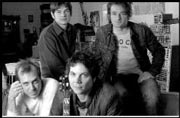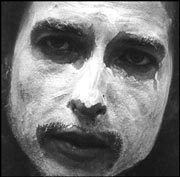In retrospect, it’s not the album itself that was so important. Certainly Yankee Hotel Foxtrot was Wilco’s giant step, the record on which the band’s creativity finally coalesced into a whole greater than its parts. And last year, when most of us fans and writers were going into multiple critical orgasms about the-album-Reprise-dare-not-release, it was easy to romanticize Wilco’s struggle to get it out to the public: the pulling of Yankee Hotel Foxtrot summed up everything wrong with the thinking at the top of the music industry food chain; Yankee Hotel Foxtrot was the greatest American rock record since Pet Sounds, or maybe Smile; Yankee Hotel Foxtrot cures headaches when applied directly to the trapezius muscles.
And, as it turned out, the album really was as good as the hype suggested—better, in fact, since the hype was always filtered through the surrounding drama—and in 10, 20, or 30 years, the relatively brief hiccup between YHF‘s originally scheduled release date on one label and its actual release on another isn’t going to mean much in the broader context.
The lesson to be taken from the Yankee Hotel Foxtrot brouhaha isn’t that major music corporations hate a band like Wilco, it’s that they were utterly blindsided by a band like Wilco, which is infinitely more depressing. Writer David Fricke summed up the corporate mindset perfectly in Sam Jones’ documentary i am trying to break your heart: “The album doesn’t immediately tell me who it’s for, it doesn’t tell me how to market it, and it doesn’t tell me how many copies it’s going to sell.”
The majors got their blindfolds tugged, but it’s misleading to read a renaissance of American music into the subsequent success of YHF, for two reasons. First, we’re still being endlessly assaulted with the same pretty, vacant anti-musicians who’ve log-jammed the mainstream for the past 10 years, and the insult is getting to be too much to bear stoically; when Billboard‘s 2002 Music Awards trot out Justin Timberlake, Creed, and Puddle of Mudd as the best American music has to offer, they’re simply stickin’ it in and breakin’ it off, as far as I’m concerned.
Second—this is the happy part—great American music is being made all the time, though you’d never know it from reading the trades.
The year that gave us releases by Christina Aguilera, Jennifer Love Hewitt, and what’s-her-name from “American Idol” also gave us The Negro Problem, Tom Waits, Drums & Tuba, Chocolate Genius, Blackalicious, Radio 4, Wayne Kramer, Jurassic 5, and Neko Case, in addition to Wilco.
All of that stuff should be on the record. It isn’t, at least not in a terribly high- profile sense, but it ought to be.
The moderately optimistic ending of i am trying to break your heart, in which Nonesuch’s David Bilther raves about how he wanted to buy the album within the first 30 seconds of hearing it, must be assessed by each viewer; but to my mind, that testimony is too glib a response, as if YHF were simply waiting for the right pair of ears (which, if one buys into the backpedaling, would’ve been any pair other than David Kahne’s at Reprise). The truth is, there was precedent for it even in the mainstream—Radiohead, most overtly—and it still got turned down.
And finally, what did all of that griping, all of that kvetching and releasing from contracts and canceled promo discs and sniping and bellyaching mean for you and me, the general listening public? Not a thing. When the album came out we bought it, and it charted. Most of us had already downloaded copies from the band’s Internet site anyway; Wilco were the ones most immediately inconvenienced by the corporate patty-cake, but even those migraines were temporary. Wilco won, artistically and financially—they bought their own rejected album from Warner, parent company of both Reprise and Nonesuch, and sold it back to them for three times the money—and so did we.
Why, then, does it still leave a bad taste?
Because everything’s up for sale in the current climate, integrity foremost. Jenny from the block comes on streetwise, then hits town with a list of rider demands that would shame Cleopatra. Evidently frustrated with its marginally subtle attempts at early-teen brainwashing, MTV now unloads its noxious “Becoming” series, in which perfectly OK everyday people are remade into their celebrity idols.
The gulf between us and the good music we might hear yawns wide—full of sound and fury, as well as the endless high-decibel, contentless yammering of people whose senses of beauty have been forever crippled.
They take an active interest in keeping good music from us. They want us to hear nothing new, nothing save that which has already proven profitable. They are trying to break our hearts.
Despite the fact that Wilco’s record is a beautiful, ringing tone of hope and wonder in the midst of all that meaningless blather, Yankee Hotel Foxtrot will always remind me of that chasm.
To my ears, that makes Wilco the best—certainly the most valuable—band of 2002.









